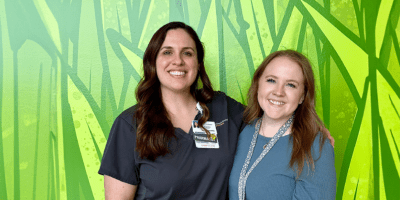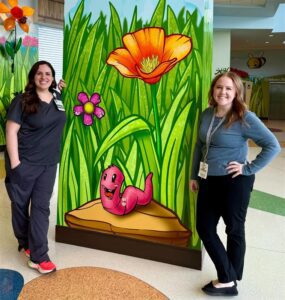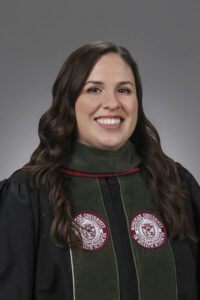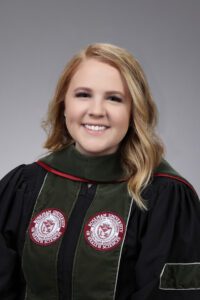Pediatric Pharmacy Careers: How Roseman University Graduates Are Making a Difference

This article is included in the Spring 2025 print edition of Roseman University’s SpectRUm magazine.
 Pediatric pharmacy is a meaningful and rapidly growing specialty where pharmacists make a lasting impact on the health and well-being of children. As pharmacy practice continues to expand, so does the demand for professionals trained to meet the unique and complex medication needs of pediatric patients.
Pediatric pharmacy is a meaningful and rapidly growing specialty where pharmacists make a lasting impact on the health and well-being of children. As pharmacy practice continues to expand, so does the demand for professionals trained to meet the unique and complex medication needs of pediatric patients.
In this spotlight, we explore the inspiring journeys of Roseman University graduates, Dr. Marissa Ross and Dr. Linzie Roberts, who have built successful careers in pediatric pharmacy. Their stories illustrate the vital role pediatric pharmacists play in healthcare and how Roseman’s accelerated PharmD program prepares students to thrive in this specialized field.
What is Pediatric Pharmacy?
Pharmacy practice has witnessed a large-scale evolution in the last decade, transforming into a diverse field offering numerous specialty opportunities. A PharmD (Doctor of Pharmacy) degree combines scientific expertise with patient-centered care, creating various career paths. One of the most impactful and specialized paths for PharmD graduates is pediatric pharmacy.
Pediatric pharmacists can be found in a wide range of practice settings, including hospitals, clinics, and community pharmacies. Many also work in specialized environments such as cystic fibrosis, oncology, or pediatric cardiology clinics, as well as in research or academic institutions. Their essential role is to ensure medication safety and effectiveness for children, carefully adjusting dosages based on age, weight, and individual patient factors. Children’s hospitals are a common practice setting for pediatric pharmacists, as these facilities typically have a higher volume of pediatric patients and require specialized medication management.
Pediatric pharmacists collaborate closely with healthcare teams, parents, and caregivers. They provide education about medication use and potential side effects, manage chronic conditions (e.g., asthma, diabetes), and support families through treatment. Additionally, pediatric pharmacists contribute to medication safety initiatives, policy development, and quality improvement projects, creating standardized medication guidelines and protocols.
The Board of Pharmacy Specialties notes that there are currently over 1,880 BPS Board-Certified Pediatric Pharmacy Specialists, underscoring the growing importance and recognition of this field within healthcare.
How Roseman’s PharmD Program Shaped Two Pediatric Pharmacy Careers
Marissa Ross, PharmD (Class of 2019), and Linzie Roberts, PharmD (Class of 2022), exemplify successful careers in pediatric pharmacy, sharing a friendship and professional journey spanning over a decade. Both currently serve at Saint Francis Children’s Hospital in Tulsa, Oklahoma, with Dr. Ross as Pharmacy Supervisor and General Pediatrics Clinical Specialist, and Dr. Roberts specializing in Pediatric Hematology/Oncology.
 Dr. Marissa Ross: From PharmD Student to Pediatric Clinical Specialist
Dr. Marissa Ross: From PharmD Student to Pediatric Clinical Specialist
Ross’ PharmD Experience at Roseman
For Dr. Ross, a direct path to her goal was what brought her to Roseman:
“After taking time off between undergrad and pharmacy school due to family and financial challenges, I was looking for an accelerated program that would allow me to complete my PharmD efficiently. As a Las Vegas native, it was an added bonus that Roseman offered a program that met my needs while allowing me to stay close to home.”
Dr. Ross found that during her program, rotations provided an enormous amount of one-on-one learning, even if daunting:
“Most of the rotations I completed, I was the only student with that preceptor. While this was a bit intimidating at first, it pushed me to learn how to use my resources and be independent early on in my career.”
A Fulfilling Career in Pediatric Pharmacy
Knowing that she wanted to be in a hospital setting and in pediatrics, she completed her Post Graduate Year One (PGY-1) residency at Saint Francis Children’s Hospital, where she currently works, which provided her a rich learning environment. While she finds working with children to be emotional, she sees the work as highly fulfilling and inspirational daily:
“Working with pediatric patients can be both emotional and challenging, but more often than not, they recover and are able to go home. What I find most inspiring is their resilience and optimism—they don’t dwell on the difficult moments but instead remember the little joys, like how many popsicles they had or how many visitors came to see them. There’s something truly special about seeing a child riding a tricycle or wagon down the hallway in their panda hospital gown—it never gets old and always serves as a reminder of their incredible strength and spirit.”
A Day in the Life: Pediatric Clinical Specialist
For those wondering what Dr. Ross’ every day might be like, she describes it well:
“I have five care teams from two different university medical schools with whom I work. Often, I will bounce between care teams during interdisciplinary rounds, or if I find a team with many complex patients, I may spend the day rounding with them only. The afternoons might include patient education, helping with transitions of care, conducting medication taste tests, preparing formal lectures for medical residents through the university, or informally working with residents while they are on the general pediatrics service.”
What energizes her is that her teaching hospital truly embraces interdisciplinary care for its patients. Knowing that this care promises the best clinical outcomes for patients, Dr. Ross appreciates being part of a team on patient rounds that typically includes medical residents, attending physicians, MD/DO/PA students, nurses, social workers, case managers, pharmacists, and child life specialists. Teams discuss each patient’s care plan and share it with the patient and their family to ensure collaborative decision-making. Beyond rounds, she notes that pharmacy has a strong presence in hospital-wide committees, reinforcing their role as essential contributors to patient care.
Advice for Future Pharmacists
Dr. Ross advises that it is okay not to know everything:
“The best advice I give to students and residents is to be comfortable with knowing what you don’t know. In healthcare, new studies, guidelines, and medications are constantly emerging, and it’s our responsibility to stay informed for the sake of our patients. No matter how long you’ve been in the field, you’ll encounter questions you don’t have an immediate answer for—and that’s okay!”
 Dr. Linzie Roberts: A Path to Pediatric Hematology and Oncology Pharmacy
Dr. Linzie Roberts: A Path to Pediatric Hematology and Oncology Pharmacy
Roberts’ PharmD Experience at Roseman
For Dr. Roberts, Roseman’s accelerated program allowed her to pursue her educational goals while raising two young children. She found that the program allowed her to complete her education in less time, helping her return to her family and career more quickly. She also connected with Roseman’s Six-Point Mastery Learning Model®:
“The block system really resonated with me—it enables an in-depth focus on one subject at a time, which I found to be a highly effective way to learn.”
Discovering a Passion for Pediatrics
Dr. Roberts discovered pediatric pharmacy during her Neonatal Intensive Care Unit (NICU) rotation in the longitudinal Advanced Pharmacy Practice Experiences (APPE) program at Mountain View Hospital. She initially thought she wanted to pursue geriatric pharmacy or retail, but the rotation introduced her to neonatal medicine and clinical pharmacy in general, which sparked an interest in pediatrics:
“The complexity and challenges of working with pediatric patients really resonated with me, and I found a true passion for the field. Since then, I have shifted my focus to pediatric oncology/hematology, but it was that NICU experience that first opened my eyes to the possibilities in pediatric pharmacy.”
Dr. Roberts completed her pediatric PGY-1 residency at Cardinal Glennon Children’s Hospital in St. Louis, MO. During residency, she realized her passion was in pediatric hematology/oncology. She did two rotations in this area, and a longitudinal clinic, which solidified her interest:
“Beyond the hematology/oncology rotations, I also got some great experience in a longitudinal Warfarin clinic and had the chance to present a Continuing Education session on pulmonary hypertension pharmacotherapy. I also was able to present my research on enhancing the Pediatric Intensive Care Unit (PICU) sedation weaning protocol. Overall, the residency really helped me build my confidence in pediatric medicine.”
This specialty allows Dr. Roberts to provide continuity of care by working with her patients at a deeper level and, at times, through long periods of therapy.
A Day in the Life of a Pediatric Hematology/Oncology Pharmacist
A day in the life of Dr. Roberts in the children’s hospital, where she serves as the pharmacist for both the inpatient unit and the outpatient oncology/hematology clinic, includes providing guidance on supplements and medication changes, as well as helping patients having trouble accessing their medications. She will also recommend reducing pill burden, adjusting doses, and adding appropriate therapies when necessary. Knowing her patients well and tailoring their therapy to meet their needs is most impactful. She feels she makes the biggest difference by building personal relationships with them and being there for their medication-related concerns.
Like Dr. Ross’ experience, Dr. Roberts agrees that the interprofessionalism at the Saint Francis Children’s Hospital is exceptional, ensuring patients are cared for from all angles—medically, socially, and emotionally:
“This teamwork helps provide the most comprehensive care, and I’ve seen firsthand how it positively impacts patient outcomes.”
Advice for Aspiring Pharmacists
Dr. Roberts’ advice for those considering a career in pharmacy: keep an open mind:
“By keeping an open mind, I discovered a passion for pediatric hematology/oncology, a field I never expected to find. It turned out to be exactly where I needed to be.”
Due to the early experiential elements of Roseman’s program, rotations in her third year in the PharmD program, and residency, she benefited from a variety of diverse experiences that helped her identify where she wanted to deepen her skills.
Roseman University’s PharmD Advantage
In 2024, 81.5% of Roseman PharmD graduates matched into residency programs, showcasing the high-quality preparation Roseman students receive. Roseman’s 3-year accelerated PharmD program equips graduates with robust clinical experience, preparing them for specialized and rewarding careers in various pharmacy sectors, including pediatric pharmacy.
Drs. Ross and Roberts, along with many other Roseman graduates in pediatric pharmacy, demonstrate the meaningful impact pharmacists can have on pediatric patients, experiencing daily inspiration from their resilience and optimism.
Interested in Pediatric Pharmacy? Contact pharmacyadmissions@roseman.edu or submit a request for more information.
 Dr. Marissa Ross: From PharmD Student to Pediatric Clinical Specialist
Dr. Marissa Ross: From PharmD Student to Pediatric Clinical Specialist Dr. Linzie Roberts: A Path to Pediatric Hematology and Oncology Pharmacy
Dr. Linzie Roberts: A Path to Pediatric Hematology and Oncology Pharmacy